Latest news on ETFs
Visit our ETF Hub to find out more and to explore our in-depth data and comparison tools
An EU parliamentary think-tank is exploring whether exchange traded funds could be used to boost the fortunes of European defence companies.
Kjeld van Wieringen, policy analyst at the policy foresight unit of the European Parliamentary Research Service, said he held talks with VanEck, the issuer of the $2.8bn VanEck Defense Ucits ETF (DFNS), Europe’s largest such vehicle, “a few weeks ago”.
The think-tank’s aim is to research ways to “encourage and facilitate private investment into European defence”. The approach to VanEck was made after President Donald Trump signalled a dramatic change in US policy on defence spending in Europe. The US has since suspended military aid to Ukraine.
The EPRS is looking at the option of creating a fund focused purely on European defence companies, excluding weapons makers from outside the region.
This approach would be a marked departure from the current portfolios of any of the six European-domiciled defence ETFs, which have been turbocharged in recent months by many European governments’ commitments to increase spending on defence.
As much as 60 per cent of DFNS is invested in US companies and only 25 per cent in Europe, including the UK. Martijn Rozemuller, chief executive of VanEck EU, said some clients had questioned the level of European exposure.
European investment in ETFs by retail investors is growing rapidly, but overall investment is still dominated by institutions such as pension funds, insurance companies and asset managers.
Jake Coulson, investment analyst at HANetf, issuer of the $1.3bn Future of Defence Ucits ETF (NATO), Europe’s second-largest defence ETF, said similar conversations had been taking place with its own client base, although a focus of the conversation had been on performance.

“Many clients are interested in the regions the ETF is providing exposure to,” Coulson said. “As we have seen in recent weeks, European defence stocks have been boosted by the Trump administration’s apparent dissatisfaction with European defence spending — there is a growing sense that Europe can no longer afford to underspend,” he added.
Coulson confirmed that US companies accounted for around 60 per cent of NATO’s portfolio.
Money has been pouring into European defence ETFs which have sucked in nearly $1.5bn in inflows in the first two months of the year, helping assets under management soar to $4.2bn according to data from ETFbook.
“Defence has been one of the standout investment themes since the onset of the conflict in Ukraine,” said Kenneth Lamont, principal at Morningstar, but he urged investors to consider their valuation assumptions.
However, he pointed out that investing in listed defence stocks is not the most efficient way to fund any expansion of the industry.
“When you buy a rising stock, the seller — not the company — profits,” Lamont said.
Instead, the companies themselves benefit most directly when issuing new equity, which is rare, as equity is the costliest form of capital, he said. Lamont added that companies tend to prefer cheaper options such as debt, but conceded this could potentially be more affordable for companies if they had a higher stock price.
Investors focused purely on returns also had several complexities to consider, given recent developments, he said.
“If the US does follow through and relinquish its role as the global security guarantor, US defence companies may well take the brunt of falling investment in that area,” Lamont said.
But even this view of how defence spending might evolve regionally needed careful consideration, he added, pointing out that Europe would have to rely on US defence companies for armaments and military technology for the foreseeable future.
“In fact, promises of large defence contracts to US firms may become key bargaining chips for Europe,” Lamont added.

Rozemuller said that DFNS, like all Ucits funds that come under EU regulation, was governed by diversification rules limiting fund investment in a single company to no more than 10 per cent of the total in normal market circumstances. The limited number of defence-focused companies in Europe might therefore make it hard to create a purely European defence ETF.
However, van Wieringen said a possible solution discussed with VanEck would be to widen the inclusion criteria to include companies that derive a smaller proportion of their revenue from the defence industry than DFNS’s constituents.
Van Wieringen said the discussions had also focused on possible seed investment for the proposed European fund. One of his ideas was that this initial investment could come from the EU, in which case “the EU should be the one to determine the characteristics of the companies that are included”.
Strict ethical screening rules for DFNS currently exclude it from investing in companies such as Rheinmetall, Germany’s largest defence company, whose share price surged after Sunday’s summit of European leaders met in London to discuss developments around Ukraine.
“Rheinmetall is currently excluded due to their involvement in depleted uranium weapons,” said Roel Houwer, product manager at VanEck EU, although he added that updates on screening for controversial weapons were conducted quarterly, which meant that index constituents could change.
in the region pledge to increase spending, but the vehicles’ exposure might need careful assessment as global events unfold.
An examination of the constituents of the two largest European-listed ETFs points to some of the difficulties that investors should bear in mind.
For example, the DFNS

